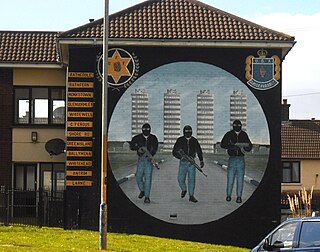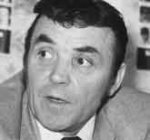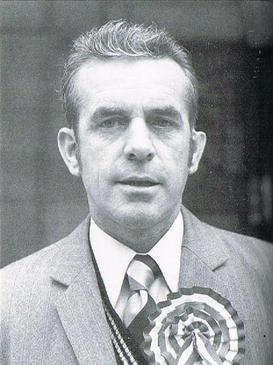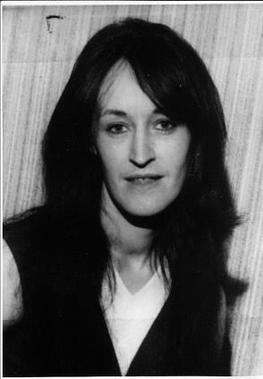Related Research Articles

John Adair, better known as Johnny Adair or Mad Dog Adair, is an Ulster loyalist drug dealer and the former leader of the "C Company", 2nd Battalion Shankill Road, West Belfast Brigade of the Ulster Freedom Fighters (UFF). This was a cover name used by the Ulster Defence Association (UDA), a loyalist paramilitary organisation. In 2002 Adair was expelled from the organisation following a violent internal power struggle. Since 2003, he, his family and a number of supporters have been forced to leave Northern Ireland by the mainstream UDA.

The Ulster Defence Association (UDA) is an Ulster loyalist paramilitary group in Northern Ireland. It was formed in September 1971 as an umbrella group for various loyalist groups and undertook an armed campaign of almost 24 years as one of the participants of the Troubles. Its declared goal was to defend Ulster Protestant loyalist areas and to combat Irish republicanism, particularly the Provisional Irish Republican Army (IRA). In the 1970s, uniformed UDA members openly patrolled these areas armed with batons and held large marches and rallies. Within the UDA was a group tasked with launching paramilitary attacks that used the cover name Ulster Freedom Fighters (UFF) so that the UDA would not be outlawed. The British government proscribed the UFF as a terrorist group in November 1973, but the UDA itself was not proscribed until August 1992.
The Ulster Political Research Group is an advisory body connected to the Ulster Defence Association (UDA), providing advice to them on political matters. The group was permanently founded in January 2002, and is largely a successor to the Ulster Democratic Party.

Andrew Samuel Duddy, known as Sammy, was a Northern Irish loyalist, having joined the Ulster Defence Association (UDA) shortly after its formation in 1971. He later became a leading member of the Ulster Political Research Group (UPRG), which provided political advice to that organisation.

John McMichael was a Northern Irish loyalist who rose to become the most prominent and charismatic figure within the Ulster Defence Association (UDA) as the Deputy Commander and leader of its South Belfast Brigade. He was also commander of the "Ulster Freedom Fighters" (UFF), a cover name for the UDA, overseeing an assassination campaign against prominent republican figures whose details were included in a notorious "shopping list" derived from leaked security forces documents. The UDA used the UFF name when it wished to claim responsibility for attacks, thus allowing it to remain a legal paramilitary organisation until August 1992 when it was proscribed by the British Government.

John "Jackie" McDonald is a Northern Irish loyalist and the incumbent Ulster Defence Association (UDA) brigadier for South Belfast, having been promoted to the rank by former UDA commander Andy Tyrie in 1988, following John McMichael's killing by the Provisional IRA in December 1987. He is also a member of the organisation's Inner Council and the spokesman for the Ulster Political Research Group (UPRG), the UDA's political advisory body.
Andrew Tyrie is a Northern Irish loyalist paramilitary leader who served as commander of the Ulster Defence Association (UDA) during much of its early history. He took the place of Tommy Herron in 1973 when the latter was killed, and led the organisation until March 1988 when an attempt on his life forced him to resign from his command.

The UDA South East Antrim Brigade was previously one of the six brigades of the Ulster Defence Association (UDA) and are heavily involved in the drug trade. It is claimed they control "100%" of an illegal drugs network in south-east County Antrim, Northern Ireland. A mural in support of the group lists its areas of activity as being Rathcoole, Rathfern, Monkstown, Glengormley and Whitewell, all of which are part of Newtownabbey, as well as Carrickfergus, the Shore Road, Greenisland, Ballymena, Whitehead, Antrim and Larne. A newer mural in the Cloughfern area of Newtownabbey and flags have updated the areas to include Ballycarry, Ballyclare, the rural hinterland of Ballymena called 'Braidside' and despite not being in County Antrim, the town of Newtownards. The Guardian has identified it as "one of the most dangerous factions". The Irish News described the brigade as 'powerful' and at one time being 'the most bloody and murderous gang operating within the paramilitary organisation'. Since 2007 the South East Antrim Brigade has operated independently of the UDA following a fall-out.
H. David "Davy" Payne was a senior Northern Irish loyalist and a high-ranking member of the Ulster Defence Association (UDA) during the Troubles, serving as brigadier of the North Belfast Brigade. He was first in command of the Shankill Road brigade of the Ulster Freedom Fighters (UFF), which was the "cover name" of the militant branch of the UDA. The group was responsible for a series of abductions and killings of mostly Catholic civilians in the early 1970s.

James Pratt Craig was a Northern Irish loyalist paramilitary during The Troubles in Northern Ireland in the latter half of the 20th century, who was a member of the Ulster Defence Association (UDA), and a command member of its Inner Council. He also ran a criminal large-scale protection racket from the West Belfast Shankill Road area, where he resided. Described by journalist David McKittrick as "Belfast's foremost paramilitary extortionist", Craig allegedly colluded at times with the enemies of the UDA, Irish Republican groups such as the Provisional Irish Republican Army (IRA) and Irish National Liberation Army (INLA), providing them with information on key loyalists which led to their subsequent murders. Aside from controlling rackets and extorting protection money from a variety of businesses, it was claimed that Craig also participated in paramilitary murders.

Tommy "Tucker" Lyttle, was a high-ranking Ulster loyalist during the period of religious-political conflict in Northern Ireland known as "the Troubles". A member of the Ulster Defence Association (UDA) – the largest loyalist paramilitary organisation in Northern Ireland – he first held the rank of lieutenant colonel and later was made a brigadier. He served as the UDA's spokesman as well as the leader of the organisation's West Belfast Brigade from 1975 until his arrest and imprisonment in 1990. According to journalists Henry McDonald and Brian Rowan, and the Pat Finucane Centre, he became a Royal Ulster Constabulary (RUC) Special Branch informer.
Alex Kerr was a Northern Irish former loyalist paramilitary. Kerr was a brigadier in the Ulster Defence Association (UDA)'s South Belfast Brigade. He is no longer active in loyalism.

Kenneth Gibson was a Northern Irish politician who was the Chairman of the Volunteer Political Party (VPP), which he had helped to form in 1974. He also served as a spokesman and Chief of Staff of the loyalist paramilitary organisation, the Ulster Volunteer Force (UVF).
David "Davy" Fogel, also known as "Big Dave", was a former loyalist and a leading member of the loyalist vigilante Woodvale Defence Association (WDA) which later merged with other groups becoming the Ulster Defence Association (UDA). Born in London, Fogel was a former British soldier who had served in Northern Ireland before marrying a local Belfast woman and settling down with his family in Woodvale, Belfast.
Jim Anderson is a loyalist paramilitary leader from Northern Ireland, who from April to December 1972, was the acting leader of the Ulster Defence Association (UDA) while its commander and the founder of the organisation, Charles Harding Smith was in jail on remand for gun-running. Upon the latter's return, Anderson, together with Harding Smith, was joint chairman of the UDA until he stood down in the spring of 1973. In the battle between Harding Smith and East Belfast brigadier, Tommy Herron for the succession to the leadership, a compromise candidate, Andy Tyrie, was appointed as chairman.
Samuel McCormick was a Northern Irish loyalist who served from 1973 until the 1980s as the brigadier for the Ulster Defence Association's (UDA) East Belfast Brigade. He had taken over the command following the shooting death of its former leader Tommy Herron.
William Elliot was a former Northern Irish loyalist who served as brigadier of the Ulster Defence Association's (UDA) East Belfast Brigade in the 1980s.

The murder of Ann Ogilby, also known as the "Romper Room murder", took place in Sandy Row, south Belfast, Northern Ireland on 24 July 1974. It was a punishment killing, carried out by members of the Sandy Row women's Ulster Defence Association (UDA) unit. At the time the UDA was a legal Ulster loyalist paramilitary organisation. The victim, Ann Ogilby, a Protestant single mother of four, was beaten to death by two teenaged girls after being sentenced to a "rompering" at a kangaroo court. Ogilby had been having an affair with a married UDA commander, William Young, who prior to his internment, had made her pregnant. His wife, Elizabeth Young, was a member of the Sandy Row women's UDA unit. Ogilby had made defamatory remarks against Elizabeth Young in public regarding food parcels. Eight weeks after Ogilby had given birth to Young's son, the women's unit decided that Ogilby would pay for both the affair and remarks with her life. The day following the kangaroo court "trial", they arranged for the kidnapping of Ogilby and her six-year-old daughter, Sharlene, outside a Social Services office by UDA man Albert "Bumper" Graham.
Christopher John Hanna, was a prison officer who held a senior position inside the Maze Prison, Northern Ireland. In June 1990 he was sentenced to life imprisonment at Maghaberry for helping the Provisional IRA kill colleague Brian Armour two years previously. He was also accused by former Ulster Defence Association (UDA) leader Andy Tyrie of complicity in UDA South Belfast brigadier John McMichael's death in 1987. McMichael was blown up by a bomb placed underneath his car. According to Tyrie, Hanna gathered information about McMichael when the latter visited loyalist inmates. Hanna in his turn passed on the information to local Belfast actress Rosena Brown, with whom Hanna was infatuated. Brown, dubbed the "IRA Mata Hari", served as an intelligence officer of the IRA. Hanna also passed on information about Armour to Brown, who was named at Hanna's trial.
Wendy Millar also known as "Bucket" and "Queen of the UDA" is a Northern Irish loyalist and a founding member of the Ulster Defence Association (UDA). She established the first UDA women's unit on her native Shankill Road in Belfast. Her two sons Herbie and James "Sham" Millar are also high-profile UDA members and her daughter's husband is former West Belfast brigadier "Fat" Jackie Thompson.
References
- 1 2 3 4 5 Deane, Seamus, Carpenter, Andrew, Williams, Jonathan (2002). The Field Day Anthology of Irish Writing Volume 5: Irish Women's Writing and Traditions. New York: New York University Press. p.1544
- 1 2 3 Wood, Ian S. (2006). Crimes of Loyalty: a History of the UDA. Edinburgh: Edinburgh University Press. p.14
- 1 2 3 4 5 6 Wood, p. 15
- 1 2 McDonald, Henry & Cusack, Jim (2004). UDA - Inside the Heart of Loyalist Terror. Penguin Ireland. p. 104
- ↑ Wood, p.94
- ↑ Wilson, Iain (14 February 2003). "Plea for calm as UDA faction heads south; The 40 Loyalists forced out of Belfast for Scotland have decided it is time to move on". The Herald via HighBeam Research. Archived from the original on 5 November 2013. Retrieved 14 May 2012.
- ↑ Simpson, Alan (1999). Murder Madness: True Crimes of the Troubles. Dublin: Gill & McMillan. pp.38-39
- ↑ Wood, p.59
- ↑ Deane, Carpenter, Williams, p.1505
- ↑ CAIN issues: Women and the Conflict - Details of Source Material Retrieved 30 April 2012